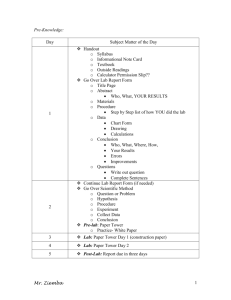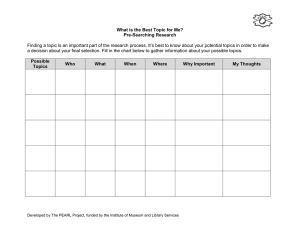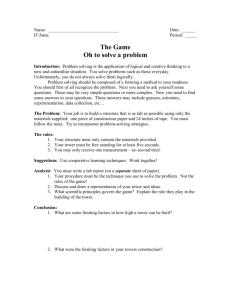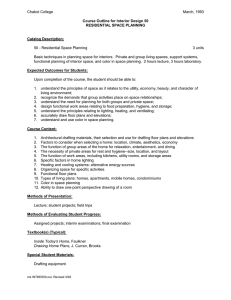Pearl River Tower
advertisement
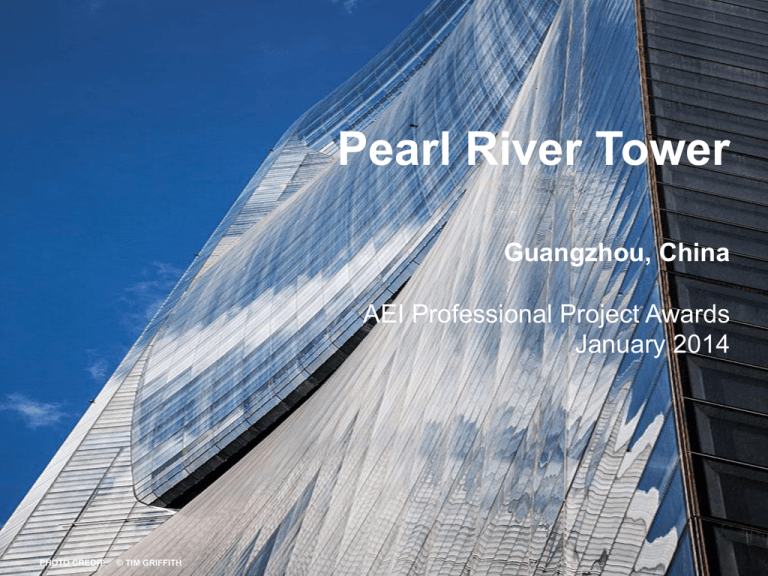
Pearl River Tower Guangzhou, China AEI Professional Project Awards January 2014 PHOTO CREDIT: © TIM GRIFFITH Pearl River Tower The 71-story (309m) Pearl River Tower (PRT) redefines what is possible in sustainable design. The high performance building has been completed as one of the most energy efficient super-tall buildings ever constructed. Key design elements include: • A precisely sculpted shape, integrated structure, and integrated vertical axis wind turbines (VWAT) that improve performance and help generate electrical power for the building. • A high-performance building envelope that increases thermal performance, controls solar loads, and optimizes the transmittance of daylight into interior spaces. • A radiant ceiling cooling system that works in tandem with direct outdoor air systems (DOAS) and indoor under-floor ventilation. The system provides improved air change effectiveness and indoor air quality. • Daylight responsive controls, working in conjunction with high efficiency lighting systems, reduce the amount of energy consumed by artificial interior lighting. PHOTO CREDIT: ©TIM GRIFFITH South Elevation East Elevation Site Context & Wind Direction The office tower sits at the northeast corner of the intersection of Jin Sui Road and West ZhuJiang Boulevard in the developing Pearl River New Town area of Guangzhou, China. Its generally rectangular floorplate has been shifted slightly from Guangzhou’s orthogonal grid in order to maximize its utilization of prevailing wind, to strategically capture the sun’s energy through photovoltaic technologies, and to avoid solar radiation. Prevailing Wind Direction Study Solar Direction Study Site Context Shape Optimization PRT has been carefully shaped to minimize design load effects from wind forces. This measure also drastically reduced construction materials and costs. SOM wind tunnel tested its shape, using the results to adjust the design in order to achieve optimal performance. Potential Power Generated by Wind Wind Direction and Distribution Shape Optimization Wind Turbines Four openings in the tower’s south side accelerate the air and drive electrical power-producing vertical axis wind turbines (VWAT). The building’s geometry significantly enhances airflow through the wind turbines—up to 2.5 times the ambient wind speed. Generated power is converted into electrical power for the building. Upper Tunnel Lower Tunnel Wind Generation (Top) Mechanical Floor Inlet (Bottom) Wind Turbine | Photo: ©Tim Griffith High Performance Envelope: East & West Elevations Pearl River Tower’s design incorporates a dynamic high performance building envelope that provides superior thermal performance, controls solar loads, and optimizes the transmittance of daylight into interior spaces. The east and west elevations use a unitized frit glass outfitted with external shades. The external glass is double silver low-E high performance glass, which provides the best balance between low heat gain and high transparency. Pearl River Tower East and North Elevations PHOTO CREDIT: ©TIM GRIFFITH High Performance Envelope: East & West Elevations A photovoltaic system is strategically integrated into the external shading system located on the east and west elevations in order to capture energy from the sun and protect the tower from solar gain. Photovoltaics PHOTO CREDIT: ©TIM GRIFFITH (TOP RIGHT) High Performance Envelope: North & South Elevations PRT’s performance is heavily impacted by the north and south elevations. In section, these facades break down into a double-wall, 300mm unitized system with a 240mm ventilated cavity that separates two layers of glazing. A low-E coated, insulating glass unit forms the exterior layer, and a single monolithic glazed panel forms the interior layer. Physics of Double-Wall System High Performance Envelope: North & South Elevations The movement of room air through the ventilated cavity is critical to removing solar gain, especially on the tower’s south elevation. The internally ventilated double-wall helps keep the temperature on the inside surface of the exterior wall close to the room ambient air temperature. AIR VELOCITY (M/S) 40 m3/hr/m 120 m3/hr/m Radiant Cooling Coupled with Under-Floor Ventilation The radiant ceiling cooling system delivers sensible cooling directly to the space, de-coupling the sensible cooling load from the latent cooling load. The radiant cooling panel system is combined with direct outdoor air systems (DOAS) and under-floor air delivery that provides improved air change effectiveness and indoor air quality. 5 Addi&onal Floors (100,000 s.f.) Daylight Responsive Controls & High Efficiency Lighting PRT uses daylighting responsive controls in conjunction with the ventilated cavity exterior wall system to automatically reduce artificial light levels in response to increased available daylight. PHOTO CREDIT: ©TIM GRIFFITH Daylighting Responsive Controls, Open PHOTO CREDIT: ©TIM GRIFFITH Daylighting Responsive Controls, Closed High Efficiency Lighting When artificial lighting must be used in office spaces, high-efficiency fluorescent lighting fixtures use curved white radiant ceiling panels as light reflectors to diffuse light evenly and efficiently. The shape of these curved ceiling panels was computer analyzed to maximize the efficiency of the reflection. High Efficiency Lighting Curved Radiant Ceiling Panel that Acts as a Light Reflector LEED-EB® Platinum

